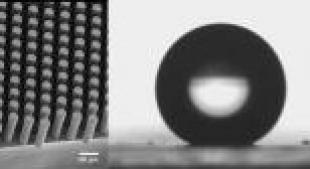How droplets and liquid films interact with surfaces and how the surfaces can affect these interactions plays a key role in many processes. Applications such as heat exchangers, microfluidics/lab-on-a-chip, anti-icing and inkjet printing are all processes that can benefit from a thorough knowledge of liquid-surface interactions.
The Wetting, Interfacial Science & Engineering Laboratory at the University of Edinburgh perform investigations into the use of designed surfaces, solid and liquid, whose properties can be changed by external forces or interfacial interactions. We investigate how smart solid surfaces can shape liquids, reduce drag or friction, control evaporation and condensation and manipulate droplets and liquid films. We also investigate how liquid surfaces and liquid-fluid interfaces can be controlled and adapted dynamically.
Our surfaces are often inspired by natural systems, such as the stay-clean Lotus leaves and slippery Nepenthes Pitcher plant and we use engineering principles with scientific understanding to produce new surfaces. The materials we create and study include superhydrophobic/oleophobic and superhydrophilic/oliophilic surfaces, lubricant impregnated surfaces, slippery liquid infused porous surfaces (SLIPS) and slippery liquid-like solid (SOCAL) surfaces, flexible polymer surfaces, ultra-smooth shaped surfaces, metamaterials, and micro-engineered and lithographically produced materials.
We use many experimental techniques to understand the science of our surfaces, including high speed video photography, contact angle goniometry, electrowetting (EWOD), Surface Acoustic Waves (SAWs), the Leidenfrost effect, and surface characterisation methods from laser scanning confocal microscopy (LSCM) to scanning electron microscopy (SEM) and atomic force microscopy (AFM).
We complement all we do with analytical and computational modelling, Lattice-Boltzmann, finite element and other complementary techniques ensuring a close and supportive collaboration between experiment and theory. Our research philosophy is “conceive, design, build and test “(CDBT) assembling teams and techniques to test theoretical ideas and to understand experiments.
Our recent research has been conducted in collaboration and with the support of the UK Engineering & Physical Sciences Research Council (EPSRC), Innovate UK, The Royal Society, overseas funding agencies, industrial partners and a range of UK and international universities. We welcome new collaborations, academic and industrial.
We also welcome enquiries from those wishing to pursue a PhD. Please see the university Graduate School pages for more details and advice on how to study for a PhD





